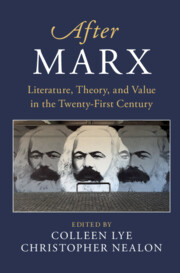Book contents
- After Marx
- After Series
- After Marx
- Copyright page
- Contents
- Contributors
- Acknowledgments
- Introduction
- Chapter 1 Black Marxism and the Antinomies of Racial Capitalism
- Chapter 2 Eco-Criticism and Primitive Accumulation in Indigenous Studies
- Chapter 3 Screening Insurrection: Marx, Cinema, Revolution
- Chapter 4 Marxist Ecology and Shakespeare
- Chapter 5 There Is No “More Commodification”: Periodizing Capitalist Transformation
- Chapter 6 The Irreconcilable: Marx after Literature
- Chapter 7 The Rise and Fall of the English-Language Literary Novel since World War II
- Chapter 8 Literature and the State
- Chapter 9 Post-Soviet Aesthetics
- Chapter 10 Lu Xun’s Literary Revolution in Chinese Marxism
- Chapter 11 Latin American Literature and Dependency Theory Today
- Chapter 12 Industry Culture: Labor and Technology in Marxist Critical Theory
- Chapter 13 In Service to Capital: Theater and Marxist Cultural Theory
- Chapter 14 Hidden Abodes and Inner Bonds: Literary Study and Marxist-Feminism
- Chapter 15 Poetry and Revolution
- Index
- References
Chapter 2 - Eco-Criticism and Primitive Accumulation in Indigenous Studies
Published online by Cambridge University Press: 12 March 2022
- After Marx
- After Series
- After Marx
- Copyright page
- Contents
- Contributors
- Acknowledgments
- Introduction
- Chapter 1 Black Marxism and the Antinomies of Racial Capitalism
- Chapter 2 Eco-Criticism and Primitive Accumulation in Indigenous Studies
- Chapter 3 Screening Insurrection: Marx, Cinema, Revolution
- Chapter 4 Marxist Ecology and Shakespeare
- Chapter 5 There Is No “More Commodification”: Periodizing Capitalist Transformation
- Chapter 6 The Irreconcilable: Marx after Literature
- Chapter 7 The Rise and Fall of the English-Language Literary Novel since World War II
- Chapter 8 Literature and the State
- Chapter 9 Post-Soviet Aesthetics
- Chapter 10 Lu Xun’s Literary Revolution in Chinese Marxism
- Chapter 11 Latin American Literature and Dependency Theory Today
- Chapter 12 Industry Culture: Labor and Technology in Marxist Critical Theory
- Chapter 13 In Service to Capital: Theater and Marxist Cultural Theory
- Chapter 14 Hidden Abodes and Inner Bonds: Literary Study and Marxist-Feminism
- Chapter 15 Poetry and Revolution
- Index
- References
Summary
This chapter explores the ways in which settler colonial racial capitalism designates Indigenous lands as nonsites of nuclear modernity, making them available for what Traci Brynne Voyles calls “wastelanding.” These are sites that are deemed unproductive, backward, and peripheral to the technological superiority of the global north but are nevertheless mined for “resources.” By homing in on the cycles of accumulation associated with uranium mining that largely occurs on Indigenous lands, I grapple with Marx’s theory of “so-called primitive accumulation” as a constitutive, contemporary, and violent extra-economic logic of settler colonial racial capitalism. Drawing on a range of theorists from classical Marxist to Critical Indigenous Studies tradition – including Peter Kropotkin, Rosa Luxemburg, Glen Coulthard, and Robert Nichols – I lead readers to the role of colonial dispossession in relation to the conceptual category of land in Capital, Vol. 1. Both building on and departing from recent revisionist accounts of primitive accumulation, I argue that Marx’s commentary on colonialism reveals the parasitic role of the state and how primitive accumulation functions as a race-making operation that is a necessary precondition for the present and future accumulation of capital.
- Type
- Chapter
- Information
- After MarxLiterature, Theory, and Value in the Twenty-First Century, pp. 40 - 54Publisher: Cambridge University PressPrint publication year: 2022
References
- 9
- Cited by

